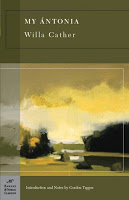I have affiliate relationships with Bookshop.org and Malaprop's Bookstore in beautiful Asheville, NC. I will earn a small commission at no additional cost to you if you purchase merchandise through links on my site. Read more on my affiliate page.
Young orphan Jim Burden is sent from Virginia to Nebraska to live with his grandparents. There is a Bohemian family on the train with him. None of them really speak English. They all get off at the same station in Black Hawk. It turns out that the family has just bought the farm next to Jim’s grandparents. Neighbors are still far apart back in 1800s Nebraska but Jim still spends a lot of time with the Shimerda family, especially Ántonia, the oldest girl and closest to his age. As he watches Ántonia grow, he realizes that she has an indomitable spirit and admires her for it.
I liked Ántonia. A lot. She’s smart, feisty, hard-working, loving, and full of life. As she grew older, I got more worried for her. This is a classic after all. I expected it to take a Thomas Hardy turn. I was pleasantly surprised when it didn’t.
More than that, Ántonia embodied the American immigrant spirit. Her family starts out living in a dugout, basically a cave dug into the earth. They were comfortable back home in Bohemia so this is an adjustment for them, but rather than complain about it, as her mother does, Ántonia does her best to help raise the family out of that hole in the ground. She has setbacks of course, and people talk about her and her unfamiliar ways, but she just keeps doing what needs to be done.
Ántonia lives in the town of Black Hawk for a while and becomes friends with a group of other immigrants. The wider group shows just how much these new settlers have to offer the country. Some become successful businesswomen, others become farm wives, some are content to just keep working in hotels and laundries. They all make some kind of mark on the world, no matter how faint.
My one complaint is the framework of the book. The author (I’m unclear whether this is supposed to be Cather herself or an unknown “Author”) meets an old friend and they start talking about Ántonia, whom they both knew. They both remember her as being a strong character and agree to write down what they remember about her. The “Author” forgets but then she receives Jim’s notes. He says, “I didn’t arrange or rearrange. I simply wrote down what of herself and myself and other people Ántonia’s name recalls to me. I suppose it hasn’t any form. It hasn’t any title, either.” And then the author says that the following is Jim’s manuscript, essentially unchanged. There follows a completely finished novel. There’s no mention of the “Author” who supposedly knew both Jim and Ántonia from childhood. It’s a small thing but it bothered me. Why not just write a book from Jim’s point of view without all this business of an unfinished manuscript and deferred authorship?
Anyway, the book is very readable, with language that evokes the plains. I haven’t spent any time in the Midwest but to me it just brings to mind mile after mile of corn and wheat fields. I hate to say it, but that sounds pretty boring to this mountain girl. Willa Cather showed me her plains, with rolling hills; amazing light; beautiful, life-giving streams and rivers; rich land; and people who are the salt of the earth. I won’t think of the Midwest the same way again after reading this book.
I highly recommend this for a beautiful read about the pioneering spirit on which America was built.
Read an excerpt.
Buy My Ántonia at
I have an affiliate relationship with Malaprop’s, my local independent bookstore located in beautiful downtown Asheville, NC; and Better World Books. I will receive a small commission at no cost to you if you purchase books through links on my site. My opinions are completely my own.







1 Comment
I've been meaning to read this for awhile. Glad for another positive review to remind me of this!